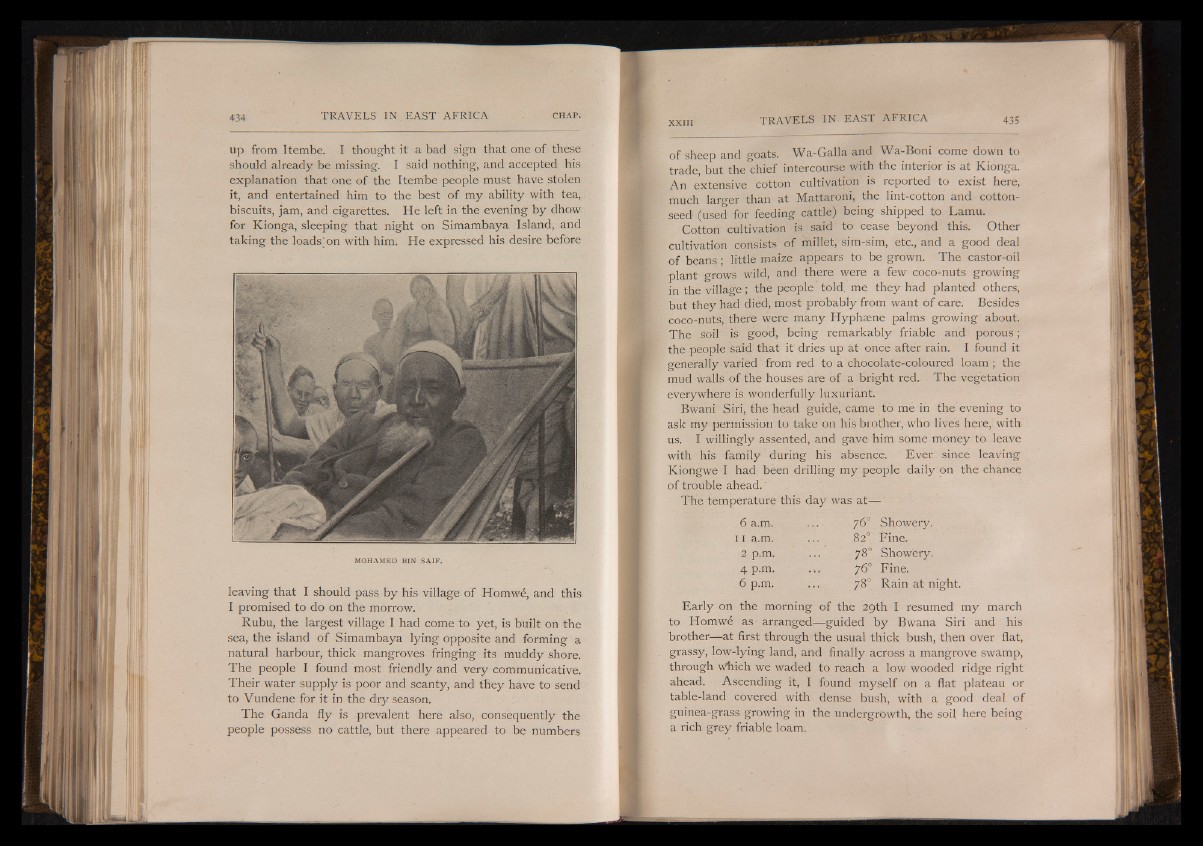
up from Itembe. I thought it a bad sign that one of these
should already be missing. I said nothing, and accepted his
explanation that one of the Itembe people must have stolen
it, and entertained him to the best of my ability with tea,
biscuits, jam, and cigarettes. He left in the evening by dhow
for Kionga, sleeping that night on Simambaya Island, and
taking the loads’on with him. He expressed his desire before
MOHAMED BIN SAIF.
leaving that I should pass, by his village of Homw6, and this
I promised to do on the morrow.
Rubu, the largest village I had come to yet, is built on the
sea, the island of Simambaya lying opposite and forming a
natural harbour, thick mangroves fringing its muddy shore.
The people I found most friendly and very communicative.
Their water supply is poor and scanty, and they have to send
to Vundene for it in the dry season.
The Ganda fly is prevalent here also, consequently the
people possess no cattle, but there appeared to be numbers
of sheep and goats. Wa-Galla and Wa-Boni come down to
trade, but the chief intercourse with the interior is at Kionga.
An extensive cotton cultivation is reported to exist here,
much larger than at Mattaroni, the lint-cotton and cottonseed
(used for feeding cattle) being shipped to Lamu.
Cotton cultivation is said to cease beyond this. Other
cultivation consists of millet, sim-sim, etc., and a good deal
of beans | little maize appears to be grown. The castor-oil
plant grows wild, and there were a few coco-nuts growing
in the village; the people told me they had planted others,
but they had died, most probably from want of care. Besides
coco-nuts, there were many Hyphaene palms growing about.
The Soil is good, being remarkably friable and porous;
the people said that it dries up at once after rain. I found it
generally varied from red to a chocolate-coloured loam; the
mud walls of the houses are of a bright red. The vegetation
everywhere is wonderfully luxuriant.
Bwani Siri, the head guide, came to me in the evening to
ask my permission to take on his brother, who lives here, with
us. I willingly assented, and gave him some money to leave
with his family during his absence. Ever since leaving
Kiongwe I had been drilling my people daily pn the chance
of trouble ahead.'
The temperature this day was at—
6 a.m. ... 76° Showery.
11 a.m. ... 82° Fine.
2 p.m. ... 78?, Showery.
4 p.m. . i. j6° Fine.
6 p.m. ... 78° Rain at night.
Early on the morning of the 29th I resumed my march
to Homw6 as arranged— guided by Bwana Siri and his
brother— at first through the usual thick bush, then over flat,
grassy, low-lying land, and finally across a mangrove swamp,
through Which we waded to reach a low wooded ridge right
ahead. Ascending it, I found myself on a flat plateau or
table-land covered with dense bush, with a good deal of
guinea-grass growing in the undergrowth, the soil here being
a rich grey friable loam.